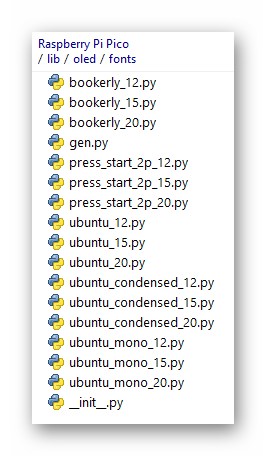Texte mit unterschiedlichen Fonts darstellen: Unterschied zwischen den Versionen
Zur Navigation springen
Zur Suche springen
Peter (Diskussion | Beiträge) |
Peter (Diskussion | Beiträge) |
||
| Zeile 78: | Zeile 78: | ||
[[file:mipy_0006.png]] | [[file:mipy_0006.png]] | ||
>>> dir(Write) | |||
['__class__', '__init__', '__module__', '__name__', '__qualname__', '__bases__', '__dict__', 'text', 'char'] | |||
>>> dir(GFX) | |||
['__class__', '__init__', '__module__', '__name__', '__qualname__', '__bases__', '__dict__', 'fill_rect', 'line', 'rect', '_slow_hline', '_slow_vline', 'circle', 'fill_circle', 'triangle', 'fill_triangle'] | |||
>>> dir(SSD1306_I2C) | |||
['__class__', '__init__', '__module__', '__name__', '__qualname__', '__bases__', '__dict__', 'fill', 'invert', 'pixel', 'scroll', 'text', 'show', 'poweron', 'init_display', 'write_cmd', 'poweroff', 'contrast', 'write_framebuf'] | |||
>>> oled.fill(0) | |||
>>> | |||
oled.fill(0) funktioniert nicht. | |||
[[Displays_mit_SSD1306_TreiberIC|Zurück]] | [[Displays_mit_SSD1306_TreiberIC|Zurück]] | ||
Version vom 14. März 2023, 23:15 Uhr
Offenbar gibt es vereschiedene Möglichkeiten verschiedene Fonts einzusetzen.
[[1]] [[2]] [[3]] [[4]] [[5]] [[6]] [[7]] [[8]]
Erster Versuch mit micropython-oled
example1.py
>>> from machine import Pin, I2C
>>> from oled import Write, GFX, SSD1306_I2C
>>> from oled.fonts import ubuntu_mono_15, ubuntu_mono_20
>>> scl = Pin(17)
sda = Pin(16)
>>> i2c = I2C(scl=scl, sda=sda)
Pin(16, Pin.OUT, value=1)
Traceback (most recent call last):
File "<stdin>", line 1, in <module>
TypeError: 'id' argument required
>>> i2c = I2C(0, scl=scl, sda=sda)
Pin(16, Pin.OUT, value=1)
Pin(16, mode=OUT)
>>> oled = SSD1306_I2C(128, 64, i2c)
gfx = GFX(128, 64, oled.pixel)
Hier hängt sich die REPL auf.
Das selbe Programm jetzt aus dem Text-Editor heraus:
from machine import Pin, I2C
from oled import Write, GFX, SSD1306_I2C
from oled.fonts import ubuntu_mono_15, ubuntu_mono_20
scl = Pin(17)
sda = Pin(16)
i2c = I2C(0, scl=scl, sda=sda)
Pin(16, Pin.OUT, value=1)
oled = SSD1306_I2C(128, 64, i2c)
gfx = GFX(128, 64, oled.pixel)
write15 = Write(oled, ubuntu_mono_15)
write20 = Write(oled, ubuntu_mono_20)
write15.text("Espresso IDE", 0, 0)
write15.text("micropython-oled", 0, 15)
gfx.line(0, 32, 127, 32, 1)
gfx.line(0, 33, 127, 33, 1)
write20.text("1234567890", 0, 35)
write15.text("Ubuntu Mono font", 0, 52)
oled.show()
Auch jetzt hängt sich das Programm ohne Fehlermeldung auf!
Offenbar bleibt es schon in dieser Zeile hängen:
oled = SSD1306_I2C(128, 64, i2c)
Die Ausgabe:
Pin(16, mode=OUT)
erscheint noch. Dann geht nichts mehr.
Diese Zeile ist der Übeltäter:
Pin(16, Pin.OUT, value=1)
Nachdem sie auskommentiert wurde funktionierte das Beispielprogramm!
Hier die Liste der enthaltenen Fonts:
>>> dir(Write) ['__class__', '__init__', '__module__', '__name__', '__qualname__', '__bases__', '__dict__', 'text', 'char'] >>> dir(GFX) ['__class__', '__init__', '__module__', '__name__', '__qualname__', '__bases__', '__dict__', 'fill_rect', 'line', 'rect', '_slow_hline', '_slow_vline', 'circle', 'fill_circle', 'triangle', 'fill_triangle'] >>> dir(SSD1306_I2C) ['__class__', '__init__', '__module__', '__name__', '__qualname__', '__bases__', '__dict__', 'fill', 'invert', 'pixel', 'scroll', 'text', 'show', 'poweron', 'init_display', 'write_cmd', 'poweroff', 'contrast', 'write_framebuf'] >>> oled.fill(0) >>>
oled.fill(0) funktioniert nicht.
